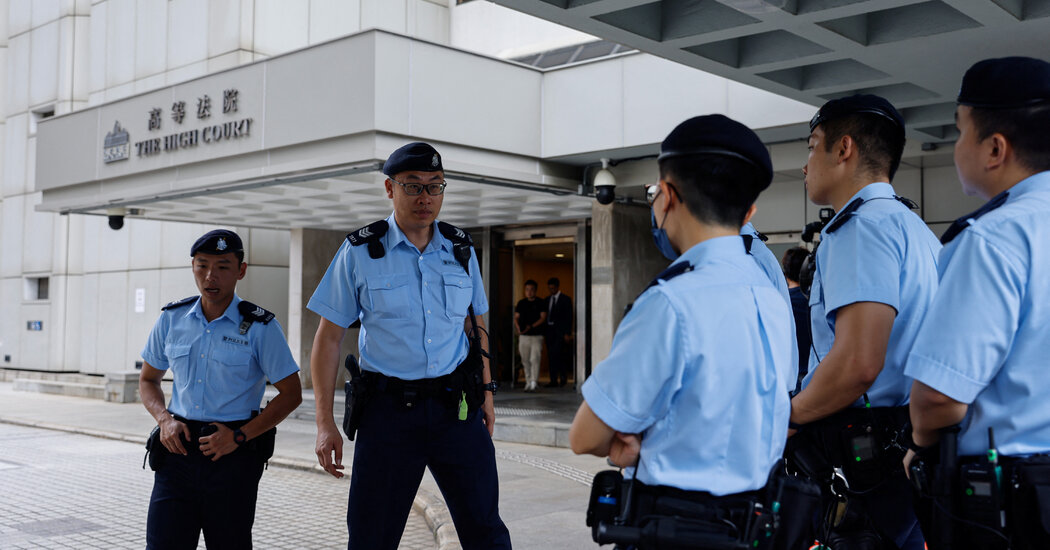A Hong Kong judge on Friday said he would rule next week on a government request to ban a popular pro-democracy song from the internet, in a case that could force Google and other companies to restrict access to the song .
It’s “Glory to Hong Kong,” the anthem of the 2019 protests that ended when Beijing tightened control of Hong Kong. Authorities claim the song is an insult to China’s national anthem and could lead people to believe that Hong Kong is an independent nation. The government has banned it in schools and lashed out when it was played, apparently by accident, at sporting events.
On Friday, after hearing three hours of legal arguments, Judge Anthony Chan said he would announce his decision on July 28. The government is seeking a court order to prohibit the publication or online distribution of “Glory to Hong Kong”. Anyone who violates the order risks imprisonment for contempt of court.
The case is being closely watched by tech companies as it has raised the specter of increased government scrutiny of online speech in Hong Kong.
“Businesses need to take note – the courts will not be able to protect them as long as the Hong Kong government can make a plausible case of national security interests,” said Thomas E. Kellogg, executive director of the Center for Asian Justice at the Georgetown University.
Google has resisted public requests from the government not to allow “Glory to Hong Kong” to appear in search results or on its sister service, YouTube. But that could change if a court ordered it to comply with the request. Like most technology companies, Google has a policy of removing or restricting access to material that is found illegal by a court in certain countries or localities.
Google, which is owned by Alphabet, said it would not comment on the matter, as did Meta, Facebook’s parent company. Google and Facebook set up offices in Hong Kong more than a decade ago, and today they each have up to several hundred employees in the city. Apple did not respond to requests for comment.
Hong Kong authorities are increasingly cracking down on what they perceive as dissent and threats to national security, targeting individuals with arrests, bounties and prosecutions.
At the same time, the government is working to pass legislation by early next year that would target what it considers subversive content and close “internet loopholes”, a move that could have wider implications and codify the ban into law.
Hong Kong has long attracted foreign companies seeking access and proximity to China away from censorship controls. It was the only Chinese area with unfettered access to services like Google and Facebook, which pulled out of China years ago.
When Google declined a request to remove the number in December, Hong Kong’s security chief called the company’s decision “unthinkable.”
In court on Friday, Benjamin Yu, a government lawyer who argued why the song should be banned, said it had been used to “stir up emotions”. He pointed to the arrest of a harmonica player who had played the song outside the British consulate last year as he mourned the death of Queen Elizabeth II.
Abraham Chan, a lawyer who acts as a friend of the court to present counter-arguments, said banning the song for national security reasons could disrupt the free flow of information.
“You can’t simply say, ‘Don’t worry about the hair-raising effects,'” he said.
Hong Kong authorities have arrested more than 250 people under a comprehensive national security law imposed on the city by Beijing in 2020, which aims to stamp out opposition to the ruling Communist Party.
Compared to “slow-moving” criminal cases against individuals, a court order could provide the government with a fast track to restrict content on online platforms, said Kevin Yam, a Melbourne-based legal researcher and former Hong Kong lawyer.
No company or individual was named as a direct defendant in the government’s court order, which contained 32 links to “Glory to Hong Kong” on YouTube.
But many fear that a court order against “Glory to Hong Kong” could be a step toward greater official control over the internet in Hong Kong, where the internet remains largely free of censorship despite Beijing’s heavier hand in governing the area.
US tech companies such as Facebook and Twitter were blocked from mainland China in 2009. A year later, Google shut down its Chinese services and redirected users to its search engine in Hong Kong, then a bulwark of political freedom on Chinese soil.
Since the introduction of the national security law, the number of requests from Hong Kong authorities for technology companies to remove content from the internet has skyrocketed.
Changche contributed reporting from Seoul.

